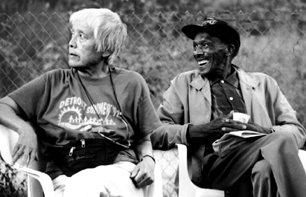
I have been reading Yuri Kochiyama's biography by Diane Fujino. It is important how Diane trys to show Yuri's growth into political activism. Diane describes Yuri's youth as one of a completely assimilated Japanese American into white middle class society even though race discrimination prevented many Nisei from obtaining employment that matched their educational level. Even as Yuri was sent to internment camp she was a patriotic American. Her brother, Peter joined the U.S. army to fight. It took huge events (the beginning of the civil rights movement) and a move to Harlem that pushed this patriotic American into revolutionary Black Nationalist. This shows that there are no easy solutions to getting people to be politically active. It is a slow and painful process—no shortcuts. It takes years and activists have to be dedicated and patient. Otherwise burning out or coming to conclusions that people are backward or don't care are common conclusions reached by many activists today.
A key area work in her life that I have been inspired by is her support of political prisoners. Yuri was part of the defense campaign of the Queens 17 which involved some of the most militant Black nationalist at the time such as Herman Ferguson and Max Stanford. On June 21, 1967 seventeen Black Nationalists, rumored to be members of Revolutionary Action Movement were arrested on charges of conspiracy. Herman Ferguson and Arthur Harris were given the additional charge of conspiracy to assassinate Roy Wilkins, leader of the NAACP and White Young of the Urban League. (p. 200) She would help raise $200,000 for the bail, and organize militant rallies; one of them attracting 2,500 black people to listen to Rap Brown, LeRoi Jones, Mae Mallory, Conrad Lynn and others.
In the early 1970s she would become the primary contact for many political prisoners. Mutulu Shakur (citizen of Republic of New Africa) said, "Anybody getting arrested, no matter Black, Puerto Rican, or whatever, our first call was to her number. Her network was like no other. She would get a lawyer or get information out to our family and the Movement. You knew she wasn't going to stop until somebody heard from you." RNA citizen Bolanile Akinwole has said of her, "Yuri was our Internet in those days."
Yuri would call political prisoners, "…the heartbeat of struggle. [They] were the most vocal and visible community activists… They are the symbols of resistance and courage. We honor them by remembering them. That their deeds live on."
Three sources I can recommend for anyone interested in Yuri's life are Diane C Fujino's biography "The Revolutionary Life of Yuri Kochiyama," Passing it on by Yuri herself, and Yuri Kochiyama: Passion for Justice which is a documentary about her.
I am out for tonitesuraj





No comments:
Post a Comment